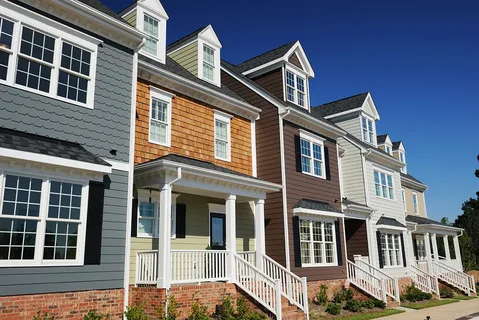Buying a townhouse can be an excellent choice for individuals and families who want the benefits of homeownership without the maintenance demands of a single-family home. Townhouses often offer more space than apartments, with the added bonus of a private entrance and a small yard or patio. However, just like with any real estate purchase, it’s essential to make a well-informed decision when buying a townhouse. Here’s a step-by-step guide to help you understand what to look for when buying a townhouse.
- Location, Location, Location
As with any property, the location of a townhouse plays a major role in your overall satisfaction and investment potential. Here are some location factors to consider:
- Proximity to Work and Schools: Make sure the townhouse is conveniently located to your workplace or school. A good location reduces commuting time and increases convenience for you and your family.
- Safety and Neighborhood: Research the safety of the neighborhood and check the crime rate. Look for a community that aligns with your lifestyle, whether it’s a quiet, residential area or a lively neighborhood with amenities.
- Nearby Amenities: Look for nearby shops, restaurants, parks, hospitals, and other essential services. Easy access to grocery stores, gyms, and entertainment can enhance your living experience.
- Future Development: Research any future developments in the area. New infrastructure projects or commercial properties can impact the property value, either positively or negatively, depending on the nature of the development.
- HOA Rules and Fees
Townhouses are often part of a homeowner’s association (HOA), which manages common areas and enforces rules for the community. It’s important to understand the HOA’s rules and fees before purchasing.
- HOA Fees: HOA fees cover the maintenance of common areas such as landscaping, snow removal, and sometimes amenities like pools or gyms. These fees can vary significantly, so it’s important to factor them into your monthly budget.
- HOA Rules: Each HOA has its own set of rules that govern things like parking, exterior modifications, and noise. Review the HOA rules to ensure they align with your lifestyle and plans. For example, some HOAs may not allow pets, certain types of home renovations, or even holiday decorations.
- Management and Responsiveness: Check if the HOA is well-managed and responsive to residents’ needs. A poorly managed HOA can lead to issues with property maintenance, neighborhood disputes, and higher fees over time.
- Size and Layout
Townhouses generally offer more space than apartments but less than single-family homes. When considering a townhouse, it’s important to evaluate the layout and how it suits your lifestyle.
- Square Footage: Ensure the townhouse has enough square footage for your family’s needs. If you have large furniture or plan to grow your family, make sure the rooms are spacious enough to accommodate your belongings and provide room to grow.
- Floor Plan: Pay attention to the layout. Townhouses typically have multiple floors, so check the flow between rooms. Ensure the number of bedrooms, bathrooms, and common spaces meet your needs. Consider how the townhouse is divided into living areas, sleeping areas, and storage space.
- Storage Space: Townhouses often have limited storage compared to single-family homes. Look for features like large closets, an attic, basement, or garage that can provide the extra storage space you need.
- Condition of the Property
The condition of the townhouse is vital to understand before making a commitment. You don’t want to end up with a property that requires expensive repairs.
- Structural Integrity: Look for signs of any structural issues, including cracks in the walls, ceiling, or foundation. These could indicate underlying problems with the property that could be costly to fix.
- Age of the Property: If the townhouse is older, be sure to ask about the age of major systems such as the roof, HVAC, plumbing, and electrical systems. These can require significant repairs or replacements if they are outdated, which could add to your costs in the near future.
- Interior Condition: Take a close look at the condition of the interior. Are there any issues with appliances, fixtures, or flooring? Ask if any recent renovations or updates have been made to the townhouse.
- Common Area Maintenance: If the townhouse is part of a community, check the condition of the shared spaces, like walkways, green areas, and parking. A well-maintained complex typically indicates that the property management is active and attentive to the needs of residents.
- Resale Value and Investment Potential
Even if you’re planning to live in the townhouse long-term, it’s important to consider its potential resale value. Here’s what to look at:
- Market Trends in the Area: Research the local real estate market and understand if property values are increasing or decreasing. A growing area with new development or commercial activity is likely to see higher property values, making your townhouse a good investment.
- Comparable Sales: Look at recent sales of similar townhouses in the neighborhood. This will give you a clear idea of the property’s value and how it compares to others.
- Condition and Features That Add Value: Consider how the townhouse’s condition and features can influence its resale potential. For instance, updated appliances, modern finishes, and well-maintained common areas can make it easier to sell in the future.
- Future Development in the Area: Research any upcoming projects, such as new schools, shopping centers, or public transport hubs. These can increase the value of the property and improve the quality of life for residents.
- Energy Efficiency and Utilities
The energy efficiency of a townhouse can impact your monthly utility bills and overall comfort.
- Energy-Efficient Features: Look for energy-efficient features like double-glazed windows, good insulation, and Energy Star-rated appliances. These can help reduce heating and cooling costs.
- Heating and Cooling Systems: Check the type of heating and cooling system the townhouse uses. If it’s an older system, it might need to be replaced soon, which could be a significant expense.
- Utility Costs: Get an estimate of the average utility costs for the townhouse, including electricity, water, gas, and internet. Some communities include certain utilities in the HOA fee, so it’s worth checking.
- Neighborhood Community and Lifestyle
The community and lifestyle in the area can greatly affect your living experience. Here’s what to look for:
- Community Vibe: Walk through the neighborhood to get a feel for the community. Is it quiet and family-oriented, or is it more lively and social? Make sure the neighborhood matches your lifestyle.
- Noise Levels: Townhouses are typically connected to neighboring units, so consider the noise levels. If the townhouse is located in a busy area, you may need to consider noise insulation.
- Nearby Schools and Parks: If you have children, proximity to good schools and parks may be important. Research local school rankings and community facilities.
Key Takeaways
- Location: Choose a townhouse in a safe, convenient area close to work, amenities, and public transport.
- HOA Rules and Fees: Understand the rules and fees of the HOA to ensure they align with your lifestyle.
- Size and Layout: Ensure the townhouse has adequate space and a functional layout to meet your needs.
- Property Condition: Inspect the townhouse for any structural issues or signs of neglect before committing.
- Resale Value: Consider the property’s potential for resale based on market trends and its condition.
- Energy Efficiency: Look for features that help keep your utility bills low and make the property more sustainable.
- Community and Lifestyle: Ensure the neighborhood aligns with your lifestyle and offers the amenities you need.
By taking these factors into account, you’ll be better equipped to choose the right townhouse that fits your needs and your long-term goals. Happy house hunting!
















